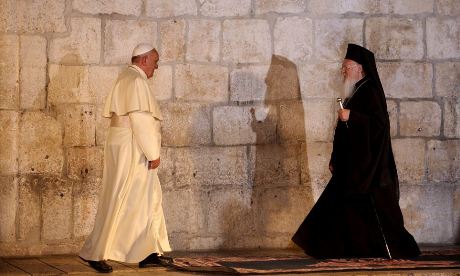Pope Francis and the Patriarch of Constantinople, Bartholomew I, have reportedly agreed to an ecumenical gathering in Nicaea in 2025.
This will mark 1700 years since the First Council of Nicaea in 325 AD, which is recognised by both east and west.
After meeting Pope Francis in Jerusalem last month, Patriarch Bartholomew told Asia News about the planned gathering.
“We agreed to leave as a legacy to ourselves and our successors a gathering in Nicaea in 2025, to celebrate together, after 17 centuries, the first truly ecumenical synod, where the Creed was first promulgated,” the patriarch reportedly said.
Nicaea is today called Iznik, in modern Turkey.
Vatican spokesman Fr Federico Lombardi said such a gathering is a nice proposal, but added he had no further details.
R. Andrew Chesnut, a professor of Catholic Studies at Virginia Commonwealth University, said the 2025 meeting would aim at improving Catholic-Orthodox relations and supporting Middle Eastern Christians.
“Both Francis and Bartholomew are not only motivated by the cause of ecumenism, but also by forming a united front against the persecution of Christianity in the Middle East where the number of Catholics and Orthodox have dwindled over the past couple decades,” Dr Chestnut said.
Francis and Bartholomew met to mark 50 years since the historic meeting between Pope Paul VI and Patriarch Athenagoras in Jerusalem.
In a joint statement Francis and Bartholomew described their Jerusalem encounter as “a new and necessary step on the journey towards the unity to which only the Holy Spirit can lead us, that of communion in legitimate diversity”.
They praised work done in theological dialogue between the traditions.
“This is no mere theoretical exercise, but an exercise in truth and love that demands an ever deeper knowledge of each other’s traditions in order to understand them and to learn from them,” the statement explained.
They affirmed that “theological dialogue does not seek a theological lowest common denominator on which to reach a compromise”.
Rather, it is about “deepening one’s grasp of the whole truth that Christ has given to his Church, a truth that we never cease to understand better as we follow the Holy Spirit’s promptings”.
Sources
